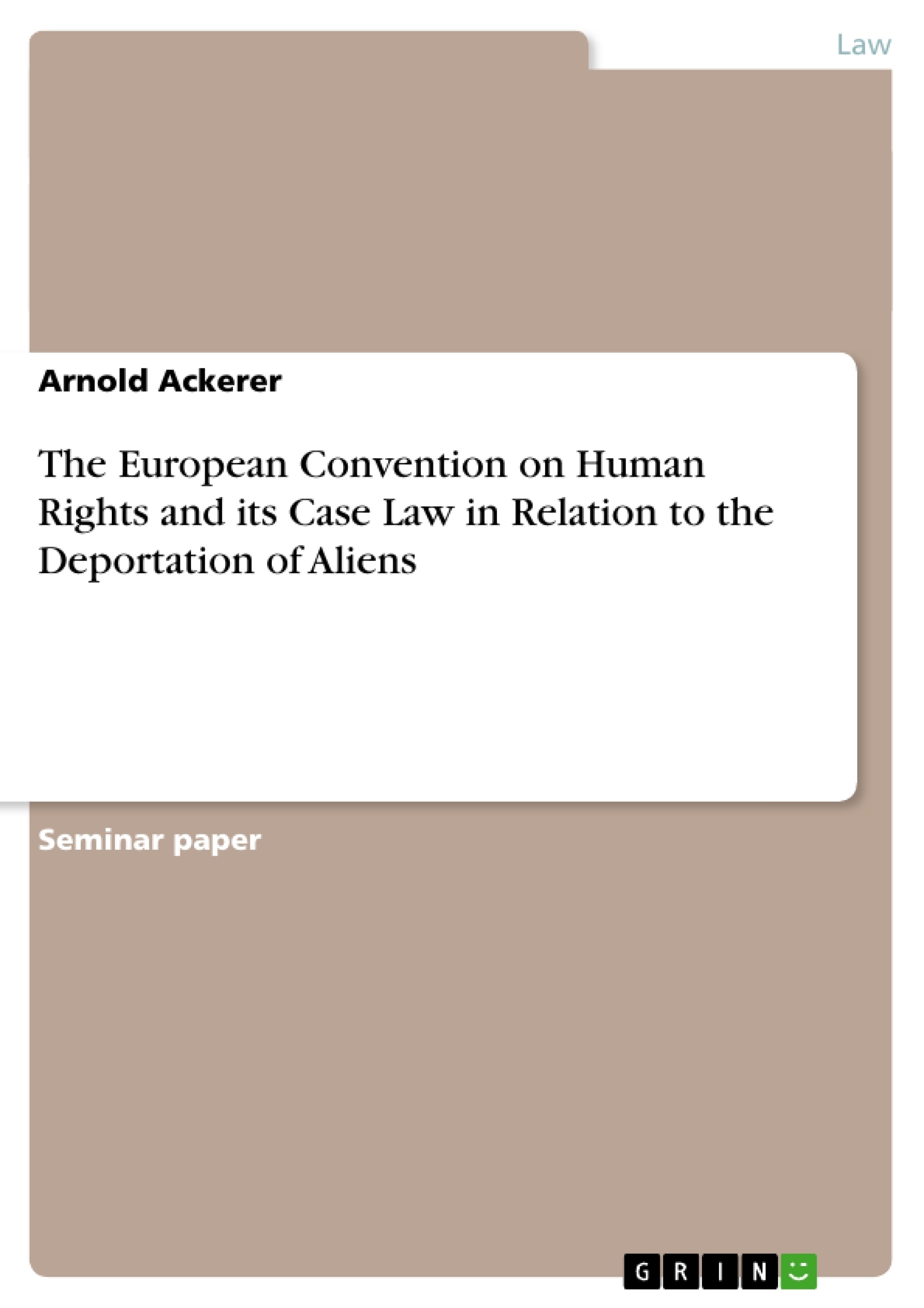To learn from the atrocities committed during the Second World War and to avoid their reoccurrence was the declared aim of all nations after the WW II was over and the Axis powers had been defeated. Once and for all it had become clear that the protection of human rights could not be regarded as any nation´s internal affairs. In Europe, Nazi-Germany served as a deterring case how a national regime could impose progressively worse treatments (from discriminations to genocide) on certain minorities, if no outside control provided an ultimate safeguard.The aim of the international law treaties signed inside Europe after WWII was to provide exactly such a safeguard and to integrate defeating and defeated countries into binding cooperation. One such cooperation took the form of the European Communities (most prominently the EC), another one the form of the Council of Europe (the organization drafting and controlling the European Convention on Human Rights (henceforth: convention)). In this paper using the issue of deportation of aliens I want to provide an overview on the position of a typical European country like Austria in regard to the obligation derived from the convention institution´s case law.
Inhaltsverzeichnis (Table of Contents)
- Introduction
- The Convention for the Protection of Human Rights and Fundamental Freedoms and the Court of Human Rights
- Background
- Compliance Mechanism
- The Rights Enshrined in the Convention
- The Relevant Case Law
- The Prohibition of Torture
- Character of Article 3
- The threshold of severity test
- Sorabjee v. UK and D. v. UK
- The Prohibition of Collective Expulsion
- Character of Art. 4 of the 4th additional protocol
- Case law
- The Right to Respect for Family and Private Life
- Character of article 8
- The article 8 test
- Case law
- The Prohibition of Torture
- Influences on the Austrian Deportation System - Reflections
- General Remarks
- Specific Influences
Zielsetzung und Themenschwerpunkte (Objectives and Key Themes)
This paper aims to provide an overview of Austria's position regarding the obligation derived from the European Convention on Human Rights (ECHR) case law, specifically focusing on the issue of alien deportation.
- The relationship between national sovereignty and the supremacy of human rights in the context of deportation.
- The application of the ECHR to deportation of aliens, including the prohibition of torture, collective expulsion, and the right to respect for family and private life.
- The impact of ECHR case law on the Austrian deportation system.
- The role of the European Court of Human Rights in safeguarding the human rights of aliens.
- The different categories of "unwanted immigration" and their impact on deportation policies.
Zusammenfassung der Kapitel (Chapter Summaries)
- Introduction: The chapter introduces the concept of deportation and its relationship to the European Convention on Human Rights (ECHR). It highlights the conflict between national sovereignty and the protection of human rights, especially in the context of immigration and deportation. It also defines the term "deportation" and distinguishes it from exclusion and extradition.
- The Convention for the Protection of Human Rights and Fundamental Freedoms and the Court of Human Rights: This chapter explores the background and purpose of the European Convention on Human Rights (ECHR). It explains how the ECHR emerged from the post-WWII era to provide a safeguard for human rights and establishes the rule of law in Europe. The chapter also discusses the compliance mechanism of the ECHR and the rights enshrined in the convention, highlighting its importance in the context of alien deportation.
- The Relevant Case Law: This chapter delves into relevant ECHR case law regarding deportation. It focuses on the prohibition of torture, collective expulsion, and the right to respect for family and private life. The chapter examines specific case examples like Sorabjee v. UK and D. v. UK, analyzing how the ECHR has interpreted and applied these rights in the context of alien deportation.
Schlüsselwörter (Keywords)
The paper examines the European Convention on Human Rights, its case law, deportation of aliens, national sovereignty, human rights, the prohibition of torture, collective expulsion, the right to respect for family and private life, and the Austrian deportation system. It investigates the role of the European Court of Human Rights in safeguarding the human rights of aliens and highlights the complexities of balancing national interests with international human rights obligations in the context of immigration and deportation.
Frequently Asked Questions
How does the ECHR protect aliens from deportation?
The European Convention on Human Rights (ECHR) protects aliens through articles like Article 3 (prohibition of torture) and Article 8 (right to family life), which can block deportation if rights are at risk.
What is the "threshold of severity test" in Article 3?
This test determines if the treatment or punishment an individual faces upon deportation is severe enough to be classified as torture or inhuman/degrading treatment.
Can family ties prevent deportation according to Article 8?
Yes, if deportation would disproportionately interfere with an individual's right to respect for their family and private life, it may be deemed unlawful under the ECHR.
What is the "Prohibition of Collective Expulsion"?
Article 4 of the 4th Protocol prohibits the expulsion of a group of aliens without an individual examination of each person's specific case.
How has ECHR case law influenced Austrian law?
Austria, like other member states, must align its deportation practices and legal decisions with the binding rulings of the European Court of Human Rights.
- Quote paper
- Arnold Ackerer (Author), 2005, The European Convention on Human Rights and its Case Law in Relation to the Deportation of Aliens, Munich, GRIN Verlag, https://www.hausarbeiten.de/document/34670


